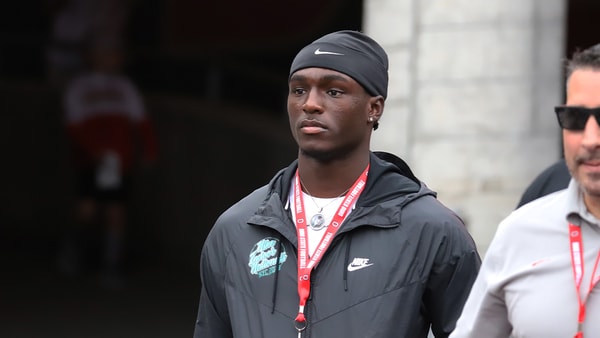Funkhouser's Guide to Podcasts - Highlander Edition
Do you ever find yourself at work, or driving in your car and can never find anything you want to listen to? Did you listen to KSR live or already knock out the podcast for the day? Would you like try some other podcasts (once you’re finished with KSR’s of course)? Each week we’ll take a look at 2-3 podcasts that might strike your interest, especially if you’ve found your way here to Funkhouser.
This week my colleague Mr. Bramblet (@rbramblet) has allowed me to take over the Podcasts post in order to talk about a single podcast (There can be only one! ). Life isn’t always about movies, or music, or following Miley Cyrus around seeing what she’ll do next. There are days, and today is the anniversary of one, when you stay up asking yourself the big questions. I don’t know about any of you, but for me this is generally a pensive, silent, and overwhelming task that leaves me dazed. I enjoy thinking about the perplexing puzzles of life, but I generally lack the framework to understand a lot of it. This leaves me treading water, without a new angle from which to view these issues. That’s what this podcast does best, provide framework for looking at why life, the earth, and human beings behave the way they do. After a couple of listens, I think you’ll agree it does a damn fine job.
Radiolab
Hosts: Jad Abumrad (@JadAbumrad) and Robert Krulwich (@rkrulwich)
Typical Day of Release: Varies (You can find the stations and air dates for radio here.)
Average Length: Approx. 1 hr, broken into three 20 minute segments
Throughout their 11 seasons producing shows for air, Radiolab has covered a large variety of topics. They have a show about laughter, why we do it and how it affects the body. They have a show about Space that tries to capture the sheer magnitude of the universe and our relatively minute place in it. They have shows on cities, on zoos, on the after life, on happy accidents, on games, and on the functioning of your guts. Each topic is approached with a journalistic attitude, using their connections and their inquisitive minds to try and provide a framework for the questions that we all ask ourselves time and again. The episodes run the gamut of emotions, and many of them leave the listener thinking about the episode long after the audio has ceased.
Probably like a lot of you, I’ve spent a lot of hours sitting behind a computer. You all know, same as I do, that when you’re forced to sit at a desk behind a computer all day, productivity comes in spurts. A good distraction, whether it be a podcast, music, or a collection of cat .gifs, is important to helping you work and getting you through the day. Last Autumn I listened to a single Radiolab podcast every work day until I had listened to all of them. They were like Pringles. I’m not going to try and go over them all, I’m not even going to try and pick a favorite episode. Instead I wanted to share with you three of my favorite segments that I’ve found while listening to this show.
1. “It’s All Relative” from the episode Time
Guests: Brian Greene – Physicist, Oliver Sacks – Neurologist
This episode, as the name details, is all about time, what it is and why it behaves the way it does. The section I enjoyed most was the second section, which was all about the relative nature of time. Having taken a few physics classes in college, I’ve always been fascinated by relativity. I don’t understand it very well, but the basic principle that time is relative to your observational position still blows my mind.
So when Radiolab sets out to explain relativity and the way in which it affects time, they go full tilt. They bring on Brian Greene, a renowned string theorist, to help with the description and together they make this difficult concept a bit easier to understand. They use silly, yet informative, stories and descriptions (complete with sound effects) to describe complicated physical and mathematical concepts without using equations. When Dr. Greene gets a little too ahead of the listener, Abumrad and Krulwich always ask the “dumb” questions we’re all thinking, which is refreshing.
After they finish with the mathematical concept of relativity, they go in a completely different direction with Neurologist Oliver Sacks. He talks about patients that he’s had who have their own relative time. You may be familiar with Oliver Sacks, he was the basis for the doctor, portrayed by Robin Williams, in the movie Awakenings. Here he talks about how some of his patients live slower or faster than the rest of us. He uses the example of a patient who moves so slowly that it takes him 2 hrs to wipe his nose!
The final section of this piece is about how time seems to slow down for athletes. They use mostly track and field players as examples, but it’s still very interesting. I’m sure that all of us wish some of our sports would seem as though they last forever.
2. “An Equation for Good” from the episode The Good Show
Guests: Richard Dawkins – Author, Oren Harmen – Author, Carl Zimmer – Journalist
This second portion comes from an episode about why we, and other species, do good things for one another. It was part of a great tandem of two shows where they explored both the good and bad sides of human nature. The whole premise for the hour long show comes out of this piece, where Robert Krulwich is interviewing Richard Dawkins and the latter says that suffering and bad are intrinsic to nature. The episode stems from the fact that the hosts don’t want to believe that good is an exception to the rule.
The first thing they explore is a scientist and mathematician named George Price. Through interviews with his biographer, Harmen, and a science journalist, Zimmer, a picture is drawn of Price’s early life. He was a chemist who worked on the Manhattan Project, and on transistors at Bell Labs in the 1950s. Price also worked for years in cancer research and laid the groundwork for computer aided design (CAD) at IBM. Then, all of a sudden, he abandoned his family and moved to London. His first week in London he went directly to the genetics department at Imperial College London and handed a professor there the equation that would later bear his name. Basically, as I understood it, the equation describes how the more similar the genetic makeup between people, the more likely they are to help one another. The example they use is that you’re more likely to help your sibling than your cousin because they share more genetic code with you than a cousin does.
The sad thing is that this hypothesis so depressed Price that he gave up his job as a researcher and spent the rest of his life attempting random acts of kindness to people he didn’t know in order to disprove his own theorem. I’ll let you listen to how it ends, it’s not exactly a fairy tale.
3. “Yellow Rain” from the episode The Fact of the Matter
Guests: Pat Walters – Producer, Matt Meselson – Harvard Chemist, En Yang & Kao Kalia Yang – Laotian Hmong Refugees
The third episode I picked explores the nature of truth and fact. This episode explores how the “truth” about a lot of things seems to change from person to person. This is a really affecting short about an intelligence officer sent to Southeast Asia, Laos, in the years after the Vietnam War. While there, rumors start to fly about the Laotian and Vietnamese governments retaliating against groups of people who helped the Americans during the war. They go to find this yellow rain, so called because it falls like rain and leaves bright yellow spots on the ground and foliage, that is seemingly killing people and livestock. The locals report that planes are dropping this yellow liquid in an attempt to kill these people in revenge.
After collecting samples, it is taken back to the US for testing and high levels of a toxin are found by a lab in Minnesota. This leads to all kinds of grandstanding between the US government and the Russians (the only ones capable of making chemical weapons at the time) including a direct accusation by President Reagan and domestic production of Serin gas. Later, lots more of the poison is tested in the UK, Sweden, and other US labs, and no one else finds any level of toxicity. This leads two chemists, Meselson and Thomas Seeley, to theorize that this “yellow rain” was actually a common mass-defecation of honey bees in the area. I’ll let the podcast do the majority of the explanation on that, but suffice to say it didn’t seem to be a chemical weapon.
The heart of this portion of the episode though, is the interview with a Laotian refugee who survived this whole ordeal. When Krulwich and producer Pat Walters interview En Yang and his niece Kalia, things get intense. Under Krulwich’s questioning the elderly refugee becomes angered and exasperated, not wanting to listen to whatever research had been done and wishing instead that people would take his suffering more seriously. It’s somewhat uncomfortable to listen to, but it brings the issue of the nature and perception of competing truths right to the forefront.
The episodes and pieces aren’t all downers like the last two pieces, I swear! What they do all have in common, though, is that they try to approach their subjects with a journalistic objectivity and they engage in gripping storytelling. Even when they blur the lines, like in that last piece, they call themselves out on it and try to give the listener area to judge for themselves.
Questions like “What is time?”, “Why are people good to one another?”, and “How do we perceive truth?” are questions that humans have been asking themselves for ages. They’re not questions with easy answers, if they have answers at all. What is needed, and something that I think the people over at Radiolab strive to give, is an extensive and balanced framework of information. This is precisely what I want in order to answer these questions to my own satisfaction. Listening to these podcasts has always given me more information than I had before listening to them. And even if some of the answers they come across aren’t simple to understand or easy to hear, I always feel better for having had the conversation. If you like to engage yourself, or if you just want to marvel at nature and the world we live in, this is the podcast for you.
If any of you have any favorite Radiolab pieces or want to discuss any of the pieces above, send me a tweet (@KalanKucera).
Also, since this wasn’t always a lighthearted piece, I wanted to end with a joke!
A guy walks into a bar. He asks the bartender, “Do you have any helicopter flavored potato chips?” The bartender shakes his head and says, “No, we only have plain.”












Discuss This Article
Comments have moved.
Join the conversation and talk about this article and all things Kentucky Sports in the new KSR Message Board.
KSBoard